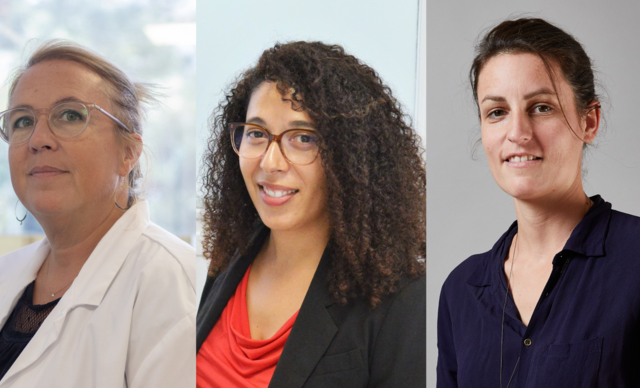At Institut Curie, from the laboratory inventor to the success story of a start-up

Two researcher-inventors from Institut Curie, Dr. Stéphanie Descroix, an expert in microfluidics and Dr. Céline Vallot, a specialist in single-cell technology, are evidence of this.
|
Innovation in health: results of the ViaVoice study for Institut Curie A survey conducted by ViaVoice among a sample of 1,000 individuals representative of the French population, aged 18 and over, in October 2023.
|
Basic research is a true melting pot for innovation, and is vital for accelerating development and the process of getting these new cutting-edge technologies to market and giving patients access to them, one of the biggest public health challenges for the next 30 years.
announces Dr. Cécile Campagne, director of the Technology Transfer Office at Institut Curie and deputy director of Carnot Curie Cancer.
Tailored support, from the birth of the innovation to its use
Although academic research is the source of the scientific results that will undeniably impact society, we have to be able to identify them and to provide the means to develop them. “Our strength at Institut Curie lies in a significant investment in the earliest phases of the technology transfer, namely the detection and maturation of inventions, in parallel with increased actions to foster awareness and training of employees,” explains Dr. Cécile Campagne.
The challenge of the TTO? To harness the innovation potential of researchers, physicians and health professionals and support them in the maturation of their projects in order to obtain a license or collaboration with a manufacturer, or even the creation of their own start-up through a integrated incubation program.
This strategy to promote innovation enabled Institut Curie to achieve a portfolio of 990 patents, over 500 collaboration contracts signed since 2011, and the creation of 31 start-ups since 2002.
Counting on quality for high-impact projects
Institut Curie’s unique innovation policy lies in its selectivity and its desire to breathe life into its projects with high socio-economic impact. “After analysis and cross-checking with the market, only technologies that demonstrate a possibility of being exploited and/or offering a solution to an identified need will be kept“, explains Dr. Jérémie Weber, deputy director of the Technology Transfer Office at Institut Curie and manager of the Industrial Partnerships and Licenses division and the Start-up division. “The same applies for start-ups.” Our goal is to create as many companies as possible but to create productive ones, with the ability to develop a technology to create a future service or product”,“ she continues.
“The idea is not to beat all fund-raising records in absolute terms, but to see what this fund-raising can help us achieve: creating jobs and providing new solutions to improve care and quality of life for patients. We are proud of the more than 350 jobs created and the 10 clinical trials in progress, and it is this impact that is very satisfying“, adds Dr. Cécile Campagne.
A tech transfer technology based on originality
In parallel with the increased professionalization of its team, the TTO is deploying a “test and learn” strategy to progress further and faster in innovation. “We very soon understood that placing our employees at the core of our actions and deliberations would be decisive“, announces Dr. Cécile Campagne.
Within this framework, an Internal Tech Transfer Ambassadors network, including Institut Curie employees, was created in 2021 to more quickly detect inventions in laboratories. A Tech Transfer Committee, a structure placing researchers and physicians at the heart of efforts to build the medical-scientific strategy for technology transfer at Institut Curie, was also put in place in 2017. An effective way to communicate the needs of inventors. This year an advisory committee of international specialists will provide expertise and challenge Institut Curie’s transfer strategy. “We are also thinking about the possible opening of an incubator, inspired by our peers abroad“, adds Cécile Campagne.
In order to be more reactive against the competition and help develop start-ups more quickly, at the end of 2023 Institut Curie will also be launching a pre-creation incubation fund based on philanthropy: it will be called Startinnov by Institut Curie. This is a way to more quickly raise funds for certain company creation projects, for example providing industrial proofs of concept before the company has even been created. Sponsors and companies interested in the projects of Institut Curie’s teams will be able to contribute as part of this dedicated charitable fund. Valuable time will be saved on a market that is often very competitive.
INNOVATION AT INSTITUT CURIE: KEY FIGURESOver 140 million euros in income generated by partnership research (excluding clinical trials) since 2011, including a record amount of 14 million in 2022 A portfolio of 990 patents (2023) 31 start-ups created since 2002 Over 800 million euros in total raised by start-ups (2023) Over 375 jobs created via start-ups (2022) Over 500 collaboration agreements signed since 2011, including 115 in 2022 |
|---|
At Institut Curie, the importance of exploiting research and technology transfer is manifested by a dedicated team of 20 professionals in the Technology Transfer Office (TTO), who advise and support the inventors from the Research Center and the Hospital Group.





